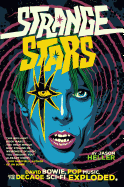
The antiwar movement, social equality and psychedelic drugs all influenced 1970s music and culture, but with the first walk on the moon and space exploration in full force, science fiction came to dominate it. Jason Heller's (Taft 2012) fun and authoritative new book makes a compelling case for how science fiction defined a decade in music.
The works of science fiction giants (Arthur C. Clarke's Childhood's End and 2001: A Space Odyssey; Anthony Burgess's dystopic A Clockwork Orange) inspired a generation of musicians, whose lush rhythms represented the enthusiasm and novelty of space travel while also expressing the dissonance of an increasingly technological world. Science fiction especially emboldened a young David Bowie, who intellectualized its themes lyrically in "Space Oddity" at the beginning of the 1970s and musically with the decade-ending "Ashes-to-Ashes." Science fiction themes would lead to the evolution of progressive rock (with forefather Jimi Hendrix leading the charge) and touch upon jazz and the psychedelic funk and soul of George Clinton and P-Funk. As the 1970s came to a close and "sci-fi became surface rather than substance," skepticism of technology and its indulgences would pave the way for the more minimalist style of punk and New Wave.
Heller's enthusiastic coverage of the decade is exhaustive and engrossing, showing how technological advances enriched rock in its polyphonic boldness and complexity. Readers not already familiar 1970s science fiction-influenced music will be inspired to explore and discover its lost melodies, especially those of David Bowie. "He wasn't from here," gushes Heller. "He wasn't of Earth." --Nancy Powell, freelance writer and technical consultant

